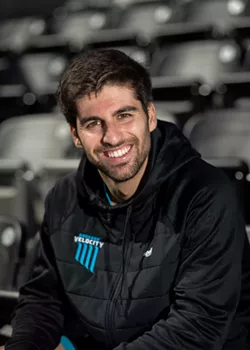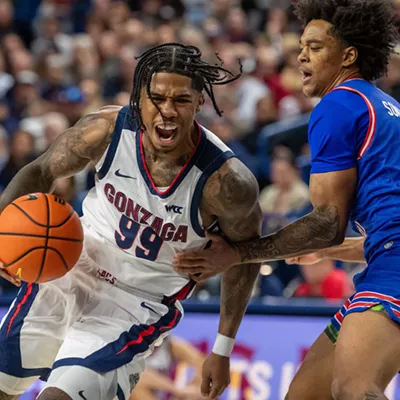
Fútbol. Futebol. Calcio. . Fußball. Soccer.
Whatever you call it, it's the most popular sport in the world.
It's not, however, the most popular sport in the United States. Though American soccer culture is growing, it's still decades behind the rest of the globe.
In the States, TV channels are hogged by the NBA and NFL. Soccer moms and expensive youth leagues give the sport a white-collar reputation instead of mass appeal. The U.S. women's national team is consistently a top-ranked team globally, but lots of people with tunnel vision only see that the men never break into the top 10.
Plus, soccer salaries are not what most Americans expect from professional sports. The minimum salary for the United Soccer League League One, where the Spokane Velocity men play, is $2,200 a month. The USL Super League, a top professional women's league, has not said publicly what the minimum salary is, but claims it's similar to the National Women's Soccer League minimum, which was about $38,000 per year in 2024. Average salaries are somewhat higher and teams do provide housing and health care, but it's nowhere near the lucrative $795,000 minimum for active roster rookie NFL players.
It begs the question: Why would anyone ever move to America to play soccer?
Because people do. Plenty, actually. They leave their families and bust language barriers and go through pretty intense culture shock — the type of culture shock that made current Velocity head coach Leigh Veidman, a Liverpool native, give up and go home six months after he moved to Iowa for college. (Obviously, he came back to the States, much to Spokane's eventual delight.)
In fact, there's so much interest from abroad that there's a cap on international players in professional U.S. soccer leagues. In order to prioritize homegrown talent, only a handful of roster spots on each 30-ish person team are available to someone who's not a permanent American resident.
Contracts for international players are usually shorter, sometimes just a year. Visas are expensive and teams have limited budgets. If a player doesn't perform well enough, coaches will give the spot to someone else. This puts a unique pressure on international players to prove their skill on the pitch immediately, while going through pretty significant upheaval off the pitch.
So, why do it?
The answer is unique to each player, though some journeys have similar themes. There's passion for the game, but there's also the pursuit of education, dreams for their families, and visions for life after soccer.
And as each player chases their goals, they leave a personal touch on the game. In the case of seven Velocity players and three Zephyr players, the international talent not only brings unique styles of play to the pitch, but a swath of life lessons that are invaluable to the locker room culture, Veidman says.
Here's a look at how four professional footballers ended up in the Inland Northwest from all over the world, plus a peek into how they're helping transform soccer in America.
Oh, and since these are stories from around the globe, football and soccer will be used interchangeably to mean the same sport. No one, not even once, will be talking about quarterbacks, wide receivers, tight ends or Taylor Swift.
RESILIENCE
Thais Reiss doesn't let setbacks stop her. Not even pretty major setbacks for a soccer player, like not having a team.Reiss, 25, grew up in Brazil before most girls there had soccer teams. From the time she was 4 years old, the native of Curitiba would play with the boys — often barefoot in the park down the street.
Not that she minded. She was good. No one doubted that she belonged. Even throughout high school she continued to train with the boys' team. When she was 15, she got called up to the national women's team. It was the first time she ever played against girls.
"From 15 to 17 years old, I would train with boys at home, and then I would travel to Rio to the national team, and then I would play girls," Reiss says. "Then I went to college."
Unlike the rest of the world, American colleges are known for their sports teams. College sports are pretty much the only option for female athletes here if they want to go pro. The extra training usually gives American women an advantage over athletes from other countries, and has historically taken American women to the top of the world soccer stage. Plus, they earn a college degree while they're at it.
"In Brazil, there's no chance you can go to school and play soccer at the same time," Reiss says.
Her mom wanted her to study, and she wanted to play soccer, so an American scholarship was pretty much the only option. Even though she didn't like school, she spent her teenage years taking extra English courses after class every week. And when she got a full ride to the University of North Florida, she took it.
"I came here when I was 17," she says. "I just came with open arms. I didn't even think about it. I came, and it was awesome. The girls in my class were so close, and they helped me so much. I don't think for a second I was scared. I mean, I was playing soccer. I was having so much fun."
There weren't any other international players on her team, and college classes in her second language were tough. With support from her teammates and the adrenaline of a teenager, Reiss made it through the first couple of semesters with some bad grades but some great soccer performances.
Reiss broke most of the women's soccer records at UNF and signed a contract with the Orlando Pride after graduating. She was teammates with her idol, Marta, the Brazilian legend so adored that she only needs one name.
But no matter how great Reiss' college numbers were, a young alumna of a small college competing for one of five international spots on a NWSL team doesn't get much time to prove herself.
There was, however, a silver lining. Even though they didn't give her much playing time, the Orlando Pride got Reiss a green card.
"It literally changed my life," Reiss says. "Even when I was in college, it was always a fear of mine of getting deported. With Orlando, it was like, if I don't get re-signed, I'm gonna have to leave the country. So that was always really stressful for me. I love the U.S. I have been here for [almost] eight years now. That's a big part of my life."
Am I ever gonna be able to play soccer again?
Since a green card means Reiss is a permanent American resident, she also doesn't have to vie for limited international roster spots anymore.
After she left the Pride, Reiss briefly played in Spain's Liga F. But she signed with the Zephyr in the newly created USL Super League just a few months after moving to Spain, ready to continue proving herself in the U.S. — a global powerhouse for women's soccer.
Then, just a month into the inaugural 2024-2025 Super League season, she tore her ACL.
"I think a lot of us who don't really get a chance, we have to do even more to show that we're good enough," Reiss says. "I think I was really fatigued and just overtrained. It's just so much stress on your body, physically and mentally."
Reiss has spent most of this season rehabbing alone. As she gets older, she's starting to realize the importance of family, she says, and how much she abandoned when she left her parents behind.
But her main focus now is the same as it was when she was 4 years old — proving that she belongs on the pitch.
"Just the thought of coming back and playing again with my teammates, that is what makes it worth it," she says. "It's hard, because this is what I've done my whole life, and all of the sudden, I'm not doing that. Am I a soccer player? Am I ever gonna be able to play soccer again? ... Coming back is, like — I can't wait."

HUNGER
One afternoon in Portmore, an urban area in southeast Jamaica, a young Andre Lewis was waiting for his older brother to finish class. Lewis was in third grade and wasn't allowed to walk home by himself.The gym teacher was announcing to the fifth grade class that the school was going to have a football team. Training would take place after school. Lewis asked if he could play, too.
The coach was surprised. Lewis was small. The coach deliberated, studied Lewis, and finally told him he could join.
Like most Jamaican boys, Lewis played plenty of soccer with neighborhood kids in the streets. But a spot on the school team differentiated him from the pack.
"I realized how good I am when my brother was on the bench, and I'm on the field," Lewis says. "My mom would come to the games, and it would just look weird, my mom asking the coach to play my older brother. I think for the last game of the season, I didn't show up so that my brother could play."
From there, opportunities kept opening up. Lewis played in youth leagues, and then the Jamaican national under-17 team, proving himself a pivotal player and a fan favorite.
"That's when I start to see a dream," he says. "That's when I start to say, 'I want to play professional soccer overseas.' I started to watch football on TV and realized, 'I can make this become a reality.'"
Playing overseas was the obvious choice for Lewis. He saw it as the most viable way he could improve life for his family. On TV, he watched interviews of Brazilian players who had gone pro and earned enough money to move their families out of the "favela," that is, urban slums in Rio de Janeiro and other metro areas.
"I want to do that as well," he says. "I want to be able to take my family outside of where I'm from in Jamaica, and also make something of myself. So I choose soccer to be my profession, and I try my best so I can get to that level."
The opportunities continued. In 2014, the Vancouver Whitecaps picked Lewis in the MLS super draft. Lewis signed a one-year contract with the Whitecaps, with an option to renew for another year if everything went well.
Lewis scored four goals and made three assists in 10 games. During practices, he got praise from his teammates and coaches, but he still rarely made playing time on the field.
That summer, Lewis tore his ACL and his meniscus. It took 11 months to recover. Then, the team didn't renew his contract. They asked him to try out again, but it stung the young player's ego.
"I just [thought], 'It's never gonna happen here. I don't think I'm getting a fair shot. I think I should move on,'" Lewis says.
From there, he took opportunities in the MLS, USL Championship, and USL League One. He returned to Jamaica for one season in 2019 to help his hometown club, Portmore United FC, win the Jamaica National Premier League.
He had hoped a good run in the MLS would earn him a chance at playing in Europe. After his injury, opportunities stalled. But now he's back in the U.S. and still chasing the dream of balling out on the world stage while bringing his family along with him. He still trusts that God and football could take him anywhere in the world.
"Football doesn't have a language," he says. "That's the raw truth."
Lewis' hunger to prove himself is a coach's dream in the new promotion and relegation system that the USL announced for 2027. The system will allow all USL teams to move up or down the levels of competition based on the previous season's wins. It could be just the opportunity Lewis needs.
This isn't quite the life he dreamed of yet. But Lewis isn't ungrateful.
"Soccer is not just the only joy of living in America," Lewis says. "It's one of the best countries in the world opportunity-wise. I have a son now, and it's a better way to give him a better life, with more opportunities that I never had. So it's not just football after everything."
Lewis hopes this season will be the first his family will be able to visit him in the U.S.

ADAPTABILITY
"Sweet are the uses of adversity," wrote the famed English sports fanatic William Shakespeare. The Stratford-upon-Avon native surely didn't know how well his words would ring true for someone else in his hometown 400 years later.Mollie Rouse grew up in that same town in the middle of England, daughter to a football coach and little sister to a football player. Like Reiss, Rouse grew up playing footy with the boys since there were no girls' teams in her hometown during her adolescent years.
As part of her local boys' youth team, Rouse learned to play smart, read the field and make decisions quickly. She also got to be part of her local club culture.
"Young boys have been brought up with their local team, and they live and breathe the local clubs," she says.
It's hard to describe how much English life revolves around football. In the U.S., men's professional soccer has four leagues that struggle for fan attendance. But in England, men's soccer has more than twice as many leagues, where the players are paid well and all the games are "raking in local fans," Rouse says.
Once she was a teenager, Rouse started playing in women's leagues and worked her way up to the top level. But despite the nation's football craze, the salary and support for women in England just weren't there yet.

"I was in the Aston Villa first team, but I wasn't getting paid," she says. "So I was stuck in limbo — I needed education, because who knows if I can keep playing, if it's gonna cover my wage, if I'm gonna need another job?"
Again, the U.S. offered the unique combo of education and competition — and one more thing that blew Rouse's mind.
"The facilities at colleges here are incredible," Rouse says. "Going from Aston Villa first team at the time to [the University of] Louisville, the facility standard was 1,000 times better at Louisville."
At the time, Rouse had no idea that the locker rooms, gyms and fields at Louisville weren't exceptional — they were pretty standard for women's Division I sports across the U.S.
Rouse left America briefly when she was called back to England to play on the under-20 World Cup team. She and her teammates brought back bronze in 2018. When she returned to the U.S., she realized there were more options, so she transferred to the University of Central Florida, where the more possessive, tactical style of play fit her strengths better.
Plus, her new coach was Tiffany Roberts Sahaydak, one of the '99ers — the women on the 1999 U.S. national team who won the World Cup.
"Looking up to her was incredible," Rouse says. "As a 19-year-old, she changed a lot of my perspective on things."
There was one thing, though, that Rouse couldn't get her mind around.
"As an international, I've always found it quite surprising that there [used to be] only one professional [women's soccer] league in America," she says. "This country is massive, and you have these college systems, which have great players. But after college, you just lose all these talented players because it's just not enough spots in the league. ... The Super League is definitely a step in the right direction."
While Rouse was in college, women's soccer had been gradually gaining momentum in England, too. Women started sharing facilities with men and playing on better fields. But right when Rouse graduated and moved back home, COVID shut down games and stalled most of that advancement.
After college, you just lose all these talented players because it's just not enough spots in the league.
Stuck in England without other options, Rouse joined a semi-professional league, the only women's league running during the pandemic. When she was able to leave the country again, Rouse joined FFC Turbine Potsdam in Germany. But her team there was slow to adapt to the new style of team culture that's emerging as women's soccer grows.
"I played a lot in Germany and learned a lot," Rouse says. "But the setup wasn't the best. The way they looked after the players wasn't very good."
There are old school and new school ways of coaching. Old schoolers would tell you that to win, players need to run more. Train more. Buck up under some tough love.
Some players respond to that. But sometimes it's hard to draw the line between tough love and verbal abuse. Plus, constant training also puts athletes — women specifically, thanks to completely different hormone and recovery cycles than men — at higher risk of injury.
Newer coaching acknowledges how an athlete's experience off the pitch contributes to their performance on the pitch. Health insurance, language help, emotional support, religious communities and adequate housing are all seen as valuable inputs for a player's output, not to mention general well-being.
"As the women's game grows and becomes more professional, those sorts of teams that [don't] have a professional environment really fall behind," Rouse says. "They think they can keep going the way they are, but you have to adapt with the times."
Rouse will keep playing football as long as she can. But whenever her career as a player ends, she plans to coach at the collegiate level in order to keep the momentum going for competitive, healthy women's soccer in the U.S. — and be the coach that the next generation of athletes look up to.
"If you grow with the times and you change as it evolves, you can stay at the top," Rouse says.

BELONGING
The mononymous Ronaldinho, one of the best soccer players to ever play the game, signed with Barcelona FC and donned the blue and garnet stripes in 2003.That same year, Nil Vinyals was also playing soccer in Barcelona — but as a 6-year-old, kicking the ball with his parents and friends, only daydreaming about the iconic stripes.
Vinyals saw Ronaldinho play live when he was about 10 years old. For most kids, watching the best in the world forces them to drop any naive hope they'll make it. But with Vinyals' talent and support, especially as the only child of a footballer and a figure skater, his potential seemed great.
"I think it was always ingrained in me that I was gonna get there," Vinyals says. "But my career and development went different ways, and maybe at times I was doing things opposite to going pro."
By the time Vinyals was 17, he had stopped taking soccer seriously. He preferred nights out with friends to mornings in the gym. His parents' split a couple years prior added to the classic teenage angst of not knowing what to do with your life.
Vinyals knew he liked sports and business, but sports management wasn't a common degree in Spain at that time. So he decided to move to the U.S. to get out of his comfort zone, pursue a relevant degree, play some soccer and get a fresh start.
He ended up in Jackson, Tennessee, at Union University, a private Baptist school that threw Vinyals into an intense subculture of American evangelicalism.
"I had no idea where I was going," he says. "The only thing I knew is that they gave me the highest scholarship, and that my coach was Brazilian [but] he spoke Spanish, and he played futsal. I played futsal, too, growing up."
Futsal is soccer's faster, squeakier cousin that's played on a basketball court (or something similar). The smaller court and harder surface hone techniques like ball control, passing accuracy and quick reflexes. Those techniques are what Ronaldinho and Barcelona FC are famous for, and what European soccer in general excels in. American soccer, on the other hand, is often less tactical and more physical, historically focusing on speed and strength instead of planning and execution.
At Union, Vinyals found a coach who could appreciate his European training. From there, he kept moving up. He quickly transferred from Union, which played in the NCAA's Division II, to Winthrop University, a Division I school in South Carolina.
He started playing professionally in the Southeast right after he graduated from college in 2018. He made a name for himself as an elite passer whose controlled, creative play elevated everyone on the field. When he joined Velocity this season, he was second in the league for assists.
A decade after Vinyals came to the U.S., Ronaldinho did, too. Last year, the soccer legend joined the ownership team of the two Greenville USL teams. The Velocity played the Greenville Triumph on March 29. Vinyals created a chance to score within 15 minutes of coming on the pitch, and the Velocity defeated the Triumph 4-nil.
Assisting, it turns out, isn't just Vinyals' priority on the pitch.
As he climbs the leaderboards in the USL, he's also dedicated to creating opportunities for people who have been excluded from competitive soccer altogether.
"I've always been in touch with the community of intellectual disabilities," Vinyals says.
Vinyals' aunt was the director of a Spanish foundation serving people with intellectual disabilities while he was growing up. When Vinyals played for the Richmond Kickers, the team hosted recreational soccer matches for youth with special needs every Sunday afternoon. Vinyals went to watch every week along with João Gomiero, a Brazilian midfielder who also played for the Kickers and had experience working with Special Olympics athletes.

"We always had in the back of our mind that there was so much more that could be done for this community," Vinyals says. "At one of the last sessions, Ryan — one of the athletes we knew and a super big Kickers fan who happens to have Down syndrome, too — he asked us, 'When can I play for the Kickers with you guys?' That's when we looked at each other and said, 'Let's see what we can do.'"
When Vinyals went back to Barcelona during the offseason, he started studying LaLiga Genuine, an extension of Spain's top soccer league LaLiga that hosts tournaments for athletes with intellectual disabilities. Since the teams are associated, someone with different intellectual capabilities can still rep Barcelona, Espanyol, or Real Madrid. The goal is to normalize high levels of aspiration and competition for footballers of all abilities.
"I think that's when everything changed, when I went back to Spain, and I saw the really high level that there is within this community," Vinyals says. "If given the platform, they can perform at a really exciting level."
Back in the States, Vinyals and Gomiero founded Project Inspire, a nonprofit dedicated to improving the well-being of disabled athletes through inclusivity and healthy competition. The Inspire League, heavily modeled after LaLiga Genuine, will kick off this year.
"It's more than soccer, but soccer is an excuse to make an impact," Vinyals says.
There are about 700,000 athletes with intellectual disabilities in the U.S., he says, but no year-round competitive leagues.
"Right now, people with intellectual disabilities live between 16 and 20 years less than the general population due to mental health and physical health," Vinyals says. "It's related to sports participation, so that's [why] we want to make the league. But it goes beyond that to well-being and inclusivity, which is our aim."
Although the athletes are not paid, the league covers the cost of coaches, nutritional plans, travel accommodations and all other expenses so the players get to compete at no cost to themselves.
The Inspire League is also partnering with the University of Pennsylvania's behavioral and decision sciences program to research — and try to remove — the stigmas that athletes with intellectual disabilities face.
Because no matter who you are, Vinyals says, soccer is fundamentally about belonging.
"It provides a sense of belonging to a community," he says. "You belong to a group of people, you identify with their values, with the way that they act, and you can get behind that. When we play or we support something that's bigger than ourselves, that's when we truly have an emotional and a human connection." ♦














